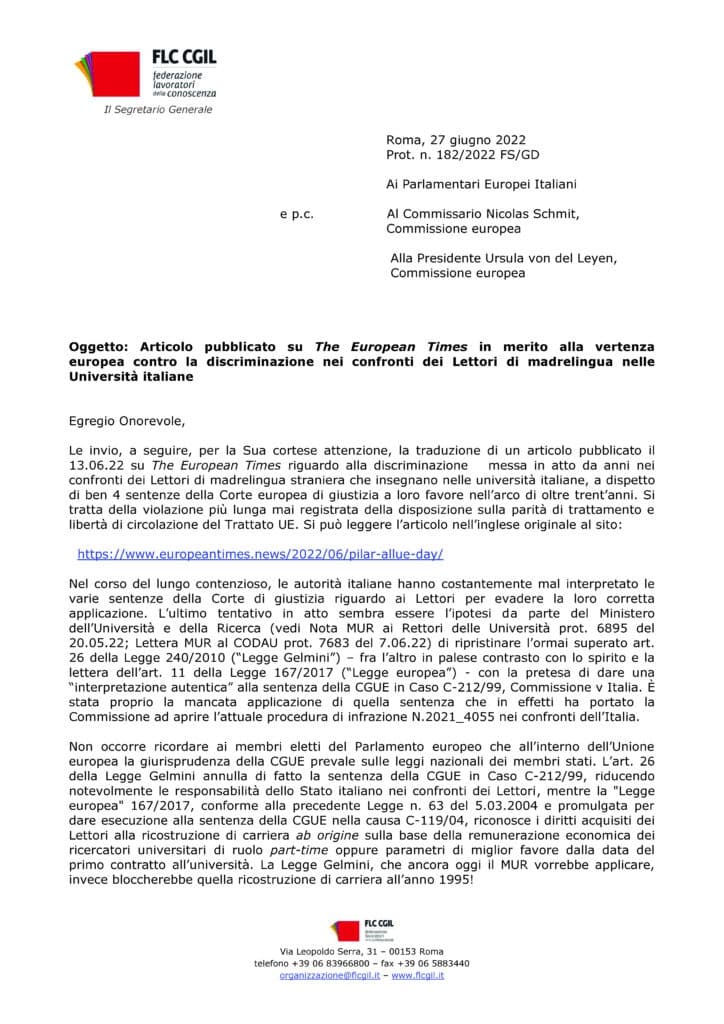Italy’s largest trade union, FLC CGIL, has written to all of the Italian deputies in the European Parliament to highlight the ongoing discrimination against non-national university teaching staff(Lettori) in the country’s universities. The letter calls on the MEPs to denounce domestic measures which continue to impede the correct implementation of the Lettori case law of the EU Court of Justice(CJEU).

By way of a briefing on the Lettori case, FLC CGIL included in its representations a copy of Pilar Allué Day, an article by University of Sapienza Professor Henry Rodgers, recently published in The European Times. Using May 30, 1989, the date of Allué’s first victory before the CJEU as a starting point, the article recounts the Lettori’s long legal battle for parity of treatment. Despite three subsequent clear-cut victories in the line of litigation which stems from the 1989 ruling, Italy continues to deny the Lettori rights which should be automatic under the Treaty. Commission infringement proceedings to compel Italy to implement the most recent of the CJEU rulings in the enforcement case of 2006 were opened in September 2021.

The FLC CGIL lobbying of the Italian MEPs is the latest in a series of initiatives which has seen the union improve its standing among Lettori. It represents a personal victory for national FLC CGIL Lettori co-ordinator, John Gilbert, an American-born lecturer at Università di Firenze, who has worked tirelessly to keep the rights of the non-national workers before the conscience of his union and to change a mindset that in the past had tended to subordinate Lettori EU rights to domestic labour arrangements.
Using its impressive national organization for the benefit of non-nationals, FLC CGIL, together with ASSO.CEL.L, a Lettori association founded at “La Sapienza” University in Rome, organized a nationwide Census of the beneficiaries of the 2006 enforcement ruling last year. University-by-university, the Census documented to the Commission’s satisfaction that the settlements prescribed under the ruling for the reconstruction of Lettori careers had not been made. Just as important, the Census puts in place a framework by means of which eventual payments by the universities to the beneficiaries over the course of the infringement proceedings can be monitored and communicated to the Commission.
Irish MEP Clare Daly has consistently championed the Lettori case at the European level. Welcoming the FLC CGIL representations to her fellow parliamentarians, she commented to The European Times:
“Defending the rights of often vulnerable non-national workers should be a priority for all unions in the member states. The FLC CGIL representations to my Italian colleagues in the European Parliament sets a good example in this regard. I am ready to work with my fellow parliamentarians to ensure that the ongoing Commission infringement proceedings bring the battle for parity of treatment to a successful conclusion.”
Of the domestic measures which have so far impeded the correct implementation of the successive Lettori CJEU sentences, the most brazen by far is the Gelmini Law of 2010. For obvious reasons, member states introduce legislation to give effect to CJEU rulings within their domestic legal order. For equally obvious reasons legislation enacted solely to interpret a CJEU ruling should be immediately suspect.
The 2010 Gemini Law interprets the Court ruling in such a way as to greatly reduce Italy’s liability to the Lettori. Prior to the enactment of the law decisions in the local courts were largely favourable to Lettori, with settlements for the reconstruction of their career following the criteria set out in the 2006 ruling. Subsequently, they were unfavourable, with the Italian judges using the Gelmini interpretation as a reference point, rather than the CJEU ruling itself.
In response to the Commission infringement proceedings provision was made in Italy’s Finance Act of 2022 for the release of funds to the universities to co-finance the settlements due to Lettori. In the guidelines recently sent from the Ministry of Higher Education to the universities on how to calculate these settlements, the Gelmini interpretation is legitimized.
It is this reference to the Italian legislator’s interpretation of the 2006 ruling, rather than a reference to the CJEU ruling itself, which FLC CGIL addresses in its letter to the Italian MEPs. Pointing out that the 2006 ruling, like all sentences of the CJEU, stands on its own merits, the union appeals to the MEPs in the spirit of their European mandate to use their influence to ensure that self-serving interpretations of the case-law of the CJEU do not further prolong the discrimination against Lettori.
Although most infringement cases are resolved over the course of the proceedings, an outcome whereby the case goes all the way to the CJEU for a fifth ruling in the Allué line of jurisprudence cannot be ruled out. Such a scenario would place Italy’s intransigence in unprecedented and most unwelcome limelight. In the 2006 enforcement case, the 13 judges of the Grand Chamber to whom the case was assigned for decision waived the daily fine of €309,750 proposed by the Commission on the grounds that the provisions of the last-minute law introduced by Italy could end the discrimination. Thus, Italy’s defence lawyers would have the unenviable task of explaining to the Court why the law which spared Italy the fines in the 2006 ruling had never subsequently been implemented
While the documentation exchanged between the Commission and the member states in infringement proceedings is confidential, what can be gleaned from exchanges between the Ministry of Higher Education and the universities is that Italy is desperate to bring the proceedings to an end. It is evident also that there is confusion on the part of the universities as to how to value their liability to the Lettori.
Ultimately a member state is responsible for the implementation of EU law within its territory. By the deadline of August 05 Italy must now inform the Commission of the measures, it has taken to meet its liabilities to the working and retired Lettori beneficiaries of the 2006 ruling.







